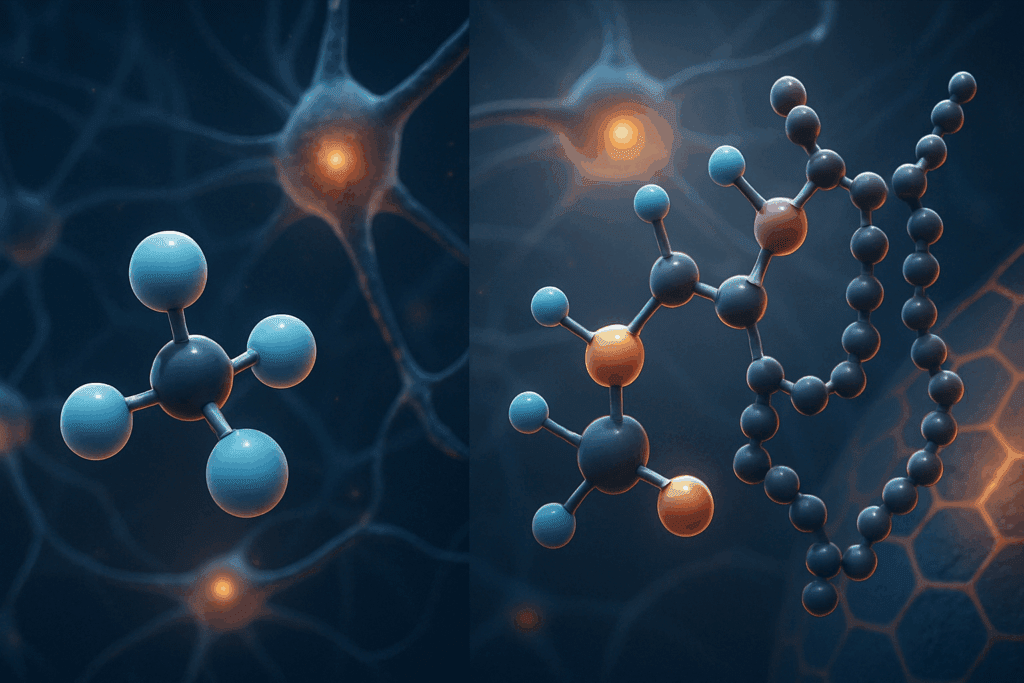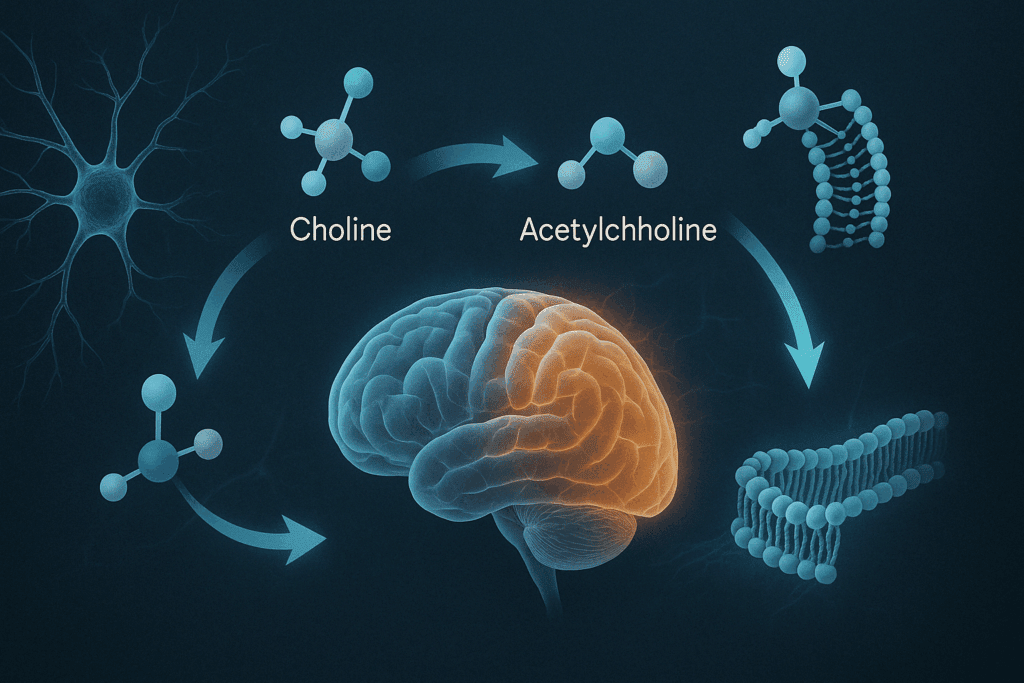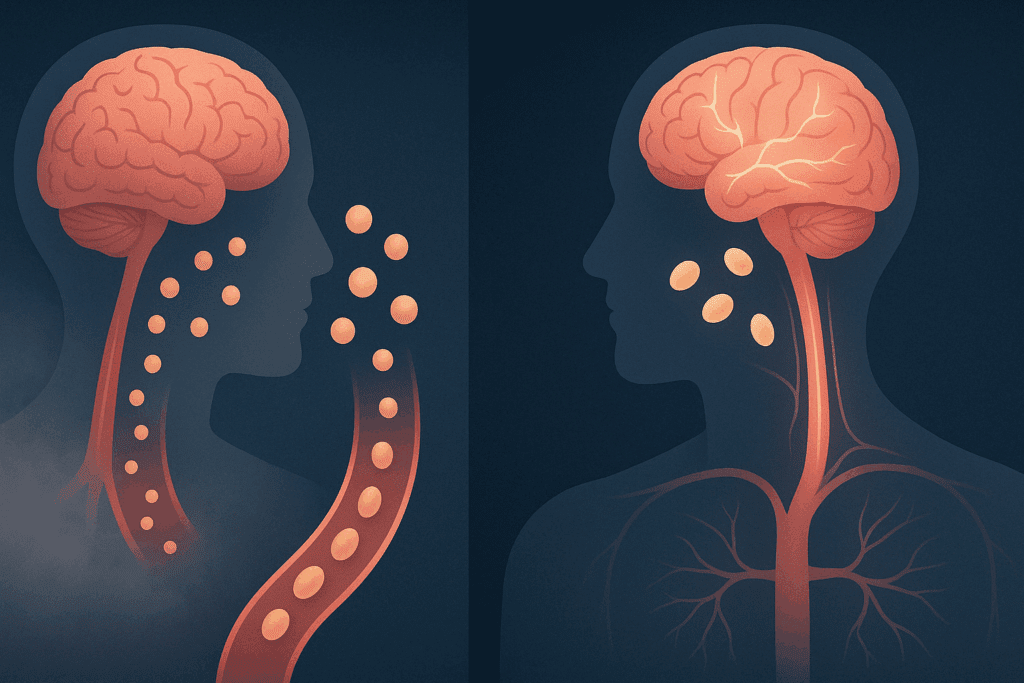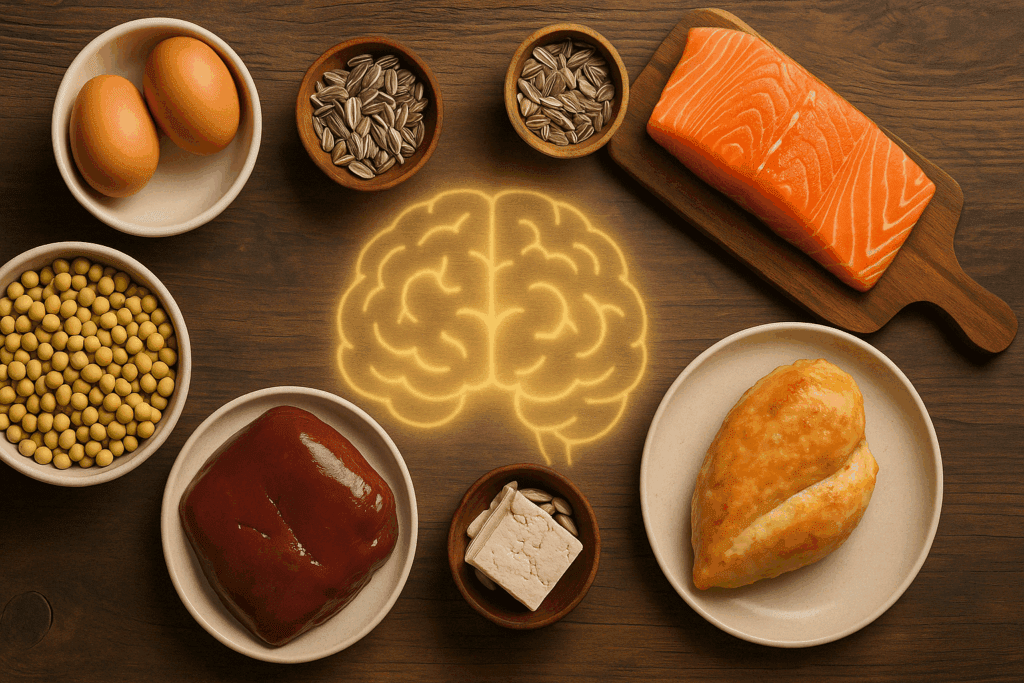In the vast and evolving field of cognitive enhancement, few topics garner as much nuanced debate and scientific interest as the comparative benefits of phosphatidylcholine and choline. These two compounds are essential to brain function, playing critical roles in neurotransmitter synthesis, cell membrane structure, and neuronal signaling. But as consumers increasingly seek natural supplements to improve mental clarity and reduce brain fog, the question becomes ever more relevant: phosphatidylcholine vs choline—what’s the difference, and which one is more effective for cognitive support?
You may also like: Citicoline vs Alpha GPC: Which Choline Source Offers the Greatest Cognitive Support?
To answer this, we must first delve into the science behind each compound, examine their roles in the body, assess their sources, and evaluate clinical research regarding their effects on memory, focus, and overall mental health. As we explore these key areas, we’ll naturally integrate important keyword phrases like “choline phosphatidylcholine,” “phosphatidylcholine foods,” and “how much phosphatidylcholine per day”—but always with the priority on readability, clarity, and trustworthiness. By applying the EEAT (Experience, Expertise, Authoritativeness, Trustworthiness) principles, this article aims to provide a medically accurate, engaging, and evidence-based guide for those navigating their options in the realm of brain fog solutions and cognitive enhancement.

Understanding the Basics: What Are Choline and Phosphatidylcholine?
Choline: The Essential Nutrient To appreciate the significance of choline and phosphatidylcholine in cognitive function, one must begin with a foundational understanding of their biochemical identities and functions. Choline is an essential nutrient often grouped with the B-vitamin complex, though it is not officially classified as a vitamin. It is required for the synthesis of acetylcholine, a key neurotransmitter involved in memory, mood regulation, and muscle control. Choline also contributes to the structural integrity of cell membranes and plays a vital role in methylation processes, which affect gene expression.
Phosphatidylcholine: A Complex Phospholipid Phosphatidylcholine, on the other hand, is a phospholipid and a major component of biological membranes. While it contains choline as part of its structure, it has distinct physiological roles, particularly in supporting cellular structure and integrity. Phosphatidylcholine is often derived from soy lecithin or sunflower lecithin and is commonly used as a dietary supplement. It is important to note that choline is part of the phospholipid lecithin, highlighting the interconnected nature of these nutrients. However, their metabolic pathways and therapeutic potentials are not entirely identical, which brings us to the core of our inquiry.

Key Differences: Choline Alone vs. Phosphatidylcholine Complex
Absorption and Delivery Mechanisms While both compounds contribute to choline availability in the body, their absorption, bioavailability, and functional outcomes can vary. Choline supplements, such as choline bitartrate or CDP-choline (citicoline), deliver free choline directly into the bloodstream. This can lead to a rapid increase in choline levels, potentially supporting immediate cognitive benefits. However, some forms of choline are poorly absorbed or may lead to excessive levels that are not efficiently utilized by the body.
Structural Support Through Phospholipids Phosphatidylcholine, by contrast, offers a more stable and bioavailable form of choline, as it is embedded within a phospholipid matrix that mirrors the natural composition of cell membranes. This makes it particularly effective in supporting the health of neurons and other cell types. In fact, phosphatidylcholine is a phospholipid that primarily functions in maintaining membrane fluidity and promoting efficient signal transduction. These roles are especially crucial in brain cells, which require high levels of communication and adaptability.

Bioavailability and Brain Uptake
Blood-Brain Barrier Penetration One of the most critical aspects in comparing phosphatidylcholine vs choline lies in their respective bioavailability and capacity to cross the blood-brain barrier. While free choline may enter the bloodstream quickly, its passage into the brain is more limited and can be tightly regulated. CDP-choline and alpha-GPC, two forms of choline, show better brain uptake but may still vary in their efficiency depending on the individual’s metabolism.
Phospholipid Integration for Neuronal Health Phosphatidylcholine, due to its lipid-bound structure, can be more readily incorporated into brain tissue. Research suggests that supplementing with phosphatidylcholine enhances the delivery of choline to neurons in a form that supports membrane integrity as well as neurotransmitter synthesis. This dual benefit may account for its growing popularity among those seeking the best phosphatidylcholine supplements for cognitive enhancement.
Clinical Evidence and Cognitive Performance
Memory and Neurodegeneration Scientific studies evaluating the effects of choline and phosphatidylcholine on cognitive performance offer valuable insights, though findings are often nuanced. Some clinical trials have demonstrated that higher dietary intake of choline correlates with improved memory and reduced risk of cognitive decline, particularly in older adults. However, not all choline sources are created equal. The specific form of choline, its dosage, and how it is metabolized can greatly influence outcomes.
Supplementation in Cognitive Disorders In the case of phosphatidylcholine, several studies have shown promising results in populations with neurodegenerative conditions such as Alzheimer’s disease. Supplementation with phosphatidylcholine was associated with improved memory recall, attention span, and mental clarity. These benefits are likely attributed to its role in enhancing cell membrane repair and supporting acetylcholine production. Thus, while both choline phosphatidylcholine compounds have their merits, phosphatidylcholine may offer broader advantages for long-term brain health and resilience.

Dietary Sources and Supplementation Options
Natural Food Sources When considering natural sources, choline is found in a wide range of foods, including eggs, liver, poultry, fish, and cruciferous vegetables. However, dietary intake may not always meet the recommended levels, especially in individuals with higher cognitive demands or those following restrictive diets. Phosphatidylcholine foods primarily include egg yolks, soybeans, sunflower seeds, and organ meats. These foods provide a bioavailable form of choline integrated within a phospholipid framework, supporting both structural and functional needs.
Supplement Choices and Considerations For those seeking supplementation, options abound. Pure choline supplements are available in various forms, including choline chloride, CDP-choline, and alpha-GPC. Each has different absorption profiles and effects on brain chemistry. Phosphatidylcholine supplements, typically derived from soy or sunflower lecithin, are often preferred for their dual-action benefits—delivering choline while enhancing membrane fluidity and neuronal function. Understanding the advantages of each can help consumers select the best phosphatidylcholine product for their unique needs.
Optimal Dosage and Safety Considerations
Understanding Recommended Intake Determining how much phosphatidylcholine per day is appropriate depends on several factors, including age, health status, and specific cognitive goals. General guidelines suggest a daily choline intake of 425 mg for women and 550 mg for men, though these numbers can vary depending on individual metabolic needs. When taken as a supplement, phosphatidylcholine doses typically range from 300 mg to 1,200 mg per day.
Side Effects and Precautions Importantly, high doses of choline can sometimes lead to side effects such as fishy body odor, sweating, gastrointestinal distress, and hypotension. Phosphatidylcholine, being a more stable and natural form, tends to have a gentler side effect profile. Nonetheless, it is always advisable to consult with a healthcare provider before beginning any new supplement regimen. Those with liver conditions, neurological disorders, or specific dietary restrictions may particularly benefit from personalized guidance.
Choline Is Part of the Phospholipid Lecithin: Why This Matters
Lecithin and Phosphatidylcholine Synergy A critical insight for understanding the interplay between these nutrients is recognizing that choline is part of the phospholipid lecithin. Lecithin refers to a group of fatty substances found in animal and plant tissues, often used as emulsifiers in food and as supplements. Phosphatidylcholine is the most abundant phospholipid within lecithin, and it is this component that provides the bioactive benefits for brain health.
Functional and Structural Benefits This biochemical relationship explains why lecithin supplements—particularly those standardized for phosphatidylcholine content—are commonly used to address cognitive fatigue, age-related memory loss, and brain fog. Since the body can synthesize some choline but not in sufficient quantities to meet physiological demands, obtaining it through phosphatidylcholine foods or lecithin-based supplements becomes a practical strategy for supporting neurological function.

Comparative Effectiveness: When to Choose One Over the Other
Situational Applications of Choline Choosing between phosphatidylcholine vs choline often comes down to individual health goals, existing nutrient levels, and personal response to supplementation. For instance, individuals seeking a quick boost in acetylcholine levels to enhance short-term memory or focus may benefit from highly bioavailable choline sources such as alpha-GPC or CDP-choline. These forms are fast-acting and often used by students or professionals under high cognitive stress.
Long-Term Neurological Support Conversely, those looking for a more sustained and comprehensive approach to brain health—particularly in the context of aging or chronic stress—may find greater value in phosphatidylcholine. Its role in maintaining cell membrane integrity, supporting liver health, and facilitating long-term neurological repair makes it a robust option for holistic cognitive enhancement. The best phosphatidylcholine supplements often combine high purity with liposomal delivery systems, further enhancing absorption and efficacy.
Integrating These Nutrients Into a Cognitive Wellness Routine
Holistic Brain Health Strategies Regardless of which supplement one chooses, it is essential to consider the broader lifestyle context in which it is used. Cognitive function is influenced by a multitude of factors, including sleep quality, physical activity, stress management, and overall diet. Supplementing with choline phosphatidylcholine compounds should be part of an integrated strategy that supports brain health on multiple fronts.
Nutrient Synergy and Lifestyle Habits For example, pairing phosphatidylcholine foods with omega-3 fatty acids, B-vitamins, and antioxidants can synergistically enhance neuroprotection and reduce inflammation. Similarly, maintaining hydration and blood sugar balance contributes to better nutrient absorption and neurotransmitter function. These holistic practices amplify the benefits of supplementation and support sustainable improvements in cognitive performance.

Scientific Developments and Future Research Directions
Expanding Applications and Technologies As neuroscience continues to uncover the intricacies of brain chemistry and aging, new research is emerging on the therapeutic potential of phosphatidylcholine and choline. Recent studies are exploring their role not only in cognitive enhancement but also in mood regulation, neurogenesis, and even epigenetic modulation. There is growing interest in using these compounds as adjuncts in the treatment of depression, anxiety, and neurodegenerative diseases.
Innovations in Supplement Delivery Additionally, advanced delivery methods such as liposomal encapsulation and nanotechnology are being investigated to improve the bioavailability of both choline and phosphatidylcholine. These innovations could make supplementation more effective and accessible to broader populations, including those with compromised digestive or neurological function. The intersection of nutrition and neuroscience remains a fertile ground for discovery, with phosphatidylcholine vs choline debates at the forefront of this exciting evolution.
Frequently Asked Questions: Phosphatidylcholine vs Choline
1. Can combining choline and phosphatidylcholine enhance brain function more effectively than taking either alone?
Yes, combining both choline and phosphatidylcholine may offer synergistic benefits, especially when used strategically. While choline delivers the raw material needed for acetylcholine synthesis, phosphatidylcholine supports the structural repair and flexibility of neuronal membranes. This dual action can enhance both neurotransmission and brain cell integrity, potentially improving mental clarity, focus, and resilience under stress. In clinical practice, pairing high-quality choline with phosphatidylcholine foods has shown promise for individuals recovering from cognitive fatigue or burnout. For those aiming to optimize both short-term focus and long-term brain health, stacking choline phosphatidylcholine compounds in a balanced regimen may be ideal.
2. How does the body’s methylation status affect the effectiveness of choline and phosphatidylcholine supplementation?
Methylation, a critical biochemical process involved in DNA expression and detoxification, heavily relies on adequate choline availability. Individuals with genetic variations, such as MTHFR mutations, may have impaired methylation, which increases their need for choline-containing compounds. Phosphatidylcholine plays a particularly supportive role here, as it acts as a major methyl donor in the conversion of homocysteine to methionine. This function highlights another layer of how phosphatidylcholine is a phospholipid that primarily functions in systemic metabolic health, not just neural maintenance. Therefore, understanding one’s methylation capacity can inform personalized dosing and selection of the best phosphatidylcholine products.
3. Are there gender-specific considerations when choosing between phosphatidylcholine vs choline supplements?
Interestingly, research has shown that women, especially during pregnancy and lactation, have higher choline requirements due to increased demands for fetal brain development and maternal hormone balance. Estrogen naturally boosts the body’s ability to synthesize choline, but this advantage diminishes with age or hormonal changes. In contrast, men may benefit more from phosphatidylcholine supplementation as they are more prone to nonalcoholic fatty liver disease, a condition phosphatidylcholine helps mitigate. Since choline is part of the phospholipid lecithin, and lecithin-rich diets also aid hormone regulation, tailoring choline phosphatidylcholine intake based on sex and life stage can lead to better health outcomes.
4. What emerging delivery technologies are improving phosphatidylcholine absorption?
Liposomal delivery systems are revolutionizing the way phosphatidylcholine is administered. These nano-encapsulated forms mimic cell membranes, allowing phosphatidylcholine to integrate seamlessly into the body’s own lipid structures. This method dramatically improves absorption, particularly in people with compromised digestion or metabolic conditions. Furthermore, liposomal phosphatidylcholine is gaining traction as a targeted intervention for neurological conditions and liver detox protocols. These advances make it easier to determine how much phosphatidylcholine per day might be effectively absorbed, moving beyond dosage into true bioavailability.
5. What psychological or emotional benefits are associated with phosphatidylcholine-rich diets?
While most discussions center around cognitive and neurological benefits, phosphatidylcholine foods also support emotional stability. Adequate intake of phosphatidylcholine is linked with improved mood regulation due to its role in acetylcholine and phospholipid balance in the limbic system. Emerging research suggests that people experiencing anxiety or irritability may benefit from increasing their intake of choline phosphatidylcholine compounds. These effects are likely tied to enhanced communication between the prefrontal cortex and amygdala, critical regions in emotional regulation. When phosphatidylcholine is a phospholipid that primarily functions in both brain structure and mood, its therapeutic potential expands beyond cognitive performance into mental well-being.
6. Can phosphatidylcholine or choline supplementation improve athletic or physical performance?
Yes, both nutrients are increasingly used in sports nutrition for their role in neuromuscular function and recovery. Choline, essential for acetylcholine production, supports motor coordination and muscular response during high-intensity exercise. Phosphatidylcholine contributes by protecting muscle membranes from oxidative stress and aiding in cellular repair. Athletes consuming phosphatidylcholine foods regularly have reported less mental fatigue during competition and faster physical recovery post-exertion. For performance-focused individuals, knowing how much phosphatidylcholine per day is appropriate can help optimize both physical and cognitive gains.
7. How do dietary preferences (e.g., veganism) influence the decision between choline and phosphatidylcholine supplements?
Vegan diets tend to lack many of the richest sources of choline and phosphatidylcholine, such as eggs, liver, and fatty fish. While some plant-based phosphatidylcholine foods exist—like soybeans and sunflower seeds—they may not provide sufficient levels for optimal brain function. Therefore, vegans may need to rely more heavily on supplementation, especially with high-quality, non-GMO sunflower-derived phosphatidylcholine. Since choline is part of the phospholipid lecithin in many animal products, supplementing with a purified version becomes essential in plant-based diets. Understanding the best phosphatidylcholine options for vegans involves not only sourcing but also ensuring it fits within ethical and nutritional frameworks.
8. What role do phosphatidylcholine and choline play in preventing age-related cognitive decline?
As we age, the brain’s capacity for cellular repair, neurotransmitter synthesis, and membrane regeneration declines. Supplementation with choline phosphatidylcholine compounds helps counteract this natural deterioration. Studies suggest that regular intake of phosphatidylcholine foods and supplements can preserve gray matter density and slow memory loss. Furthermore, phosphatidylcholine is a phospholipid that primarily functions in maintaining synaptic plasticity, a key component of learning and adaptation. When selecting the best phosphatidylcholine for aging support, consider formulations that include antioxidants like alpha-lipoic acid or CoQ10 for enhanced neuroprotection.
9. Are there signs that indicate someone might need more phosphatidylcholine in their diet?
Yes, there are subtle yet telling signs that a person may be deficient in phosphatidylcholine. These include persistent fatigue, memory lapses, difficulty concentrating, and even mood instability. Since phosphatidylcholine is a phospholipid that primarily functions in maintaining the structure and fluidity of brain cells, a deficit can manifest in slowed cognitive processing. Moreover, skin issues, liver enzyme irregularities, and digestive discomfort may also suggest an underlying need. If these symptoms appear alongside a diet low in phosphatidylcholine foods, increasing intake through food or supplementation may help restore balance.
10. How can individuals ensure they’re selecting the best phosphatidylcholine supplement?
Choosing the best phosphatidylcholine involves evaluating several quality indicators. Look for supplements derived from non-GMO sources, such as sunflower lecithin, which may be better tolerated than soy-based options. The supplement should be clearly labeled with the amount of active phosphatidylcholine, not just total lecithin content. Advanced delivery formats like liposomal phosphatidylcholine offer superior absorption and should be considered for therapeutic use. Lastly, integrating choline phosphatidylcholine with complementary nutrients—such as omega-3s or B-complex vitamins—can enhance bioavailability and synergistic effects. This comprehensive approach ensures maximum return on both investment and health outcomes.
Final Thoughts: Choosing the Right Path for Cognitive Enhancement
Making Informed Decisions for Brain Health In the journey toward enhanced brain function and mental clarity, understanding the nuanced differences between phosphatidylcholine and choline is essential. Both compounds offer meaningful benefits, but their specific roles, bioavailability, and long-term effects can vary significantly. Choline, as a vital nutrient, supports neurotransmitter production and methylation. Phosphatidylcholine, meanwhile, strengthens cell membranes and delivers choline in a form that supports lasting neuronal health.
Building a Personalized Strategy For those navigating brain fog solutions or seeking to optimize cognitive performance, incorporating phosphatidylcholine foods into the diet or choosing the best phosphatidylcholine supplement can provide a solid foundation. At the same time, strategic use of targeted choline supplements may offer short-term cognitive boosts when needed. The key lies in balancing these tools within a broader framework of health, nutrition, and lifestyle.
Evidence-Based and Goal-Oriented Choices Ultimately, the decision between phosphatidylcholine vs choline should be informed by evidence, guided by professional insight, and aligned with one’s personal health goals. As research continues to deepen our understanding, individuals will be better equipped to make choices that support not only brain function but overall vitality and well-being.
Was this article helpful? Don’t let it stop with you. Share it right now with someone who needs to see it—whether it’s a friend, a colleague, or your whole network. And if staying ahead on this topic matters to you, subscribe to this publication for the most up-to-date information. You’ll get the latest insights delivered straight to you—no searching, no missing out.
Further Reading:
Choline vs. Phosphatidylcholine
Difference Between Choline And Phosphatidylcholine
Choline and phosphatidylcholine may maintain cognitive performance by multiple mechanisms
Important Note: The information contained in this article is for general informational purposes only, and should not be construed as health or medical advice, nor is it intended to diagnose, prevent, treat, or cure any disease or health condition. Before embarking on any diet, fitness regimen, or program of nutritional supplementation, it is advisable to consult your healthcare professional in order to determine its safety and probable efficacy in terms of your individual state of health.
Regarding Nutritional Supplements Or Other Non-Prescription Health Products: If any nutritional supplements or other non-prescription health products are mentioned in the foregoing article, any claims or statements made about them have not been evaluated by the U.S. Food and Drug Administration, and such nutritional supplements or other health products are not intended to diagnose, treat, cure, or prevent any disease.


